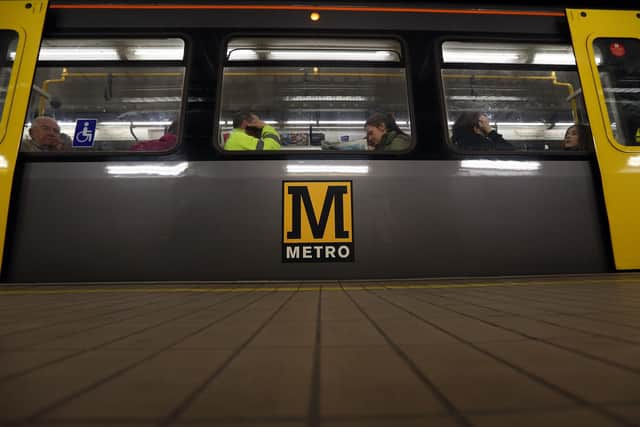Government accused of being 'dangerously unrealistic' as Metro bosses told to expect social-distancing will end in April
and live on Freeview channel 276
Metro chiefs submitted a recovery plan to the Department for Transport (DfT) this week, detailing how the network can bounce back from a cash crisis caused by Covid-19 – which could lead to increased ticket fares and cuts to services.
But it has emerged that the DfT had told Metro operator Nexus to base its plans on an assumption that social distancing will no longer be needed and more normal travel can resume in April – a prospect that looks highly unlikely, with the nation in another lockdown until at least mid-February and Covid infection and death numbers escalating rapidly.
Advertisement
Hide AdAdvertisement
Hide Ad

The DfT has only committed to continuing that emergency funding, so far totalling more than £30million, until April and asked Nexus and other light rail networks to come up proposals to put services back on more sustainable footing.
A worst case scenario forecast has predicted a £30million blackhole in the Metro’s budget if the grant disappears and passenger numbers remain low.
Nexus’ chief operating officer Martin Kearney has warned that passenger numbers cannot climb above 50% until social distancing is removed, a situation that could still result in a £500,000 weekly deficit.
Councillor Martin Gannon, chair of the North East Joint Transport Committee and Labour leader of Gateshead Council, said: “We know that the Government understands how important bus and Metro services are for the North East and we’re keen to agree a long-term plan for funding these vital services.
“It’s clear that the impact of the pandemic is still being felt and it’s going to take a long time for public transport to recover fully. Government needs to provide something that recognises this going forward.”
Advertisement
Hide AdAdvertisement
Hide AdNexus said that passenger numbers during the third lockdown have not yet dropped as low as during the first, currently standing at around 16% of normal levels, but that it may need to seek more immediate financial help from the government if those figures drop further.
Bosses also say that their “estimates will need to change accordingly” in the event that social distancing remains after April 1, and that the central focus of their recovery plan is to seek continued emergency funding in order to avoid cutting services and plunging the Metro into a downward spiral of decline.
A Nexus spokesperson said: “The Government has provided us with four financial support packages. These total £33million and latest tranche of funding, allocated in October, will support Metro services until the end of March this year.
“The first lockdown saw passenger numbers fall to 5%. In the current lockdown it has fallen to 16%.
Advertisement
Hide AdAdvertisement
Hide Ad“If there is a drop off back to the levels of March 2020 then we might need to seek further support. The funding we have had in the current financial year is intended to cover our net losses in full.
“A Metro recovery plan has been submitted to the Department for Transport. If restrictions are not lifted by April then our estimates will need to change.
“The main thrust of the recovery plan is to seek the continuation of emergency funding because we need financial support in order to stimulate demand and attract customers back to Metro, rather than have to cut service provision. Talks remain ongoing with Government.”
Newcastle Lib Dem councillor Greg Stone said the April 1 date was “dangerously unrealistic” and warned of an impending reckoning for the Metro’s finances.
He added: “The bleak reality is that the Government cannot guarantee bailouts will continue forever, and Metro cannot count on an upsurge in passengers and fare income. A crunch is looming for Nexus’s finances and LA7 leaders need an urgent plan to avoid major cuts to vital public transport services in 2022.”
Advertisement
Hide AdAdvertisement
Hide AdThe DfT said that it set “central assumptions” for recovery plans that were “indicative only and intended to achieve a level of consistency across operators’ plans”, adding that any future requests for Covid funding “will be assessed in due course”.
A spokesperson said: “We have been providing emergency funding to support light rail systems including the Tyne & Wear Metro throughout the pandemic, and will continue to work with operators during this difficult time.
“This funding has ensured that light rail services have continued to run, enabling essential journeys such as those made by NHS staff and other key workers.
“Once current restrictions are lifted, these services will also play an important role in our economic recovery.”